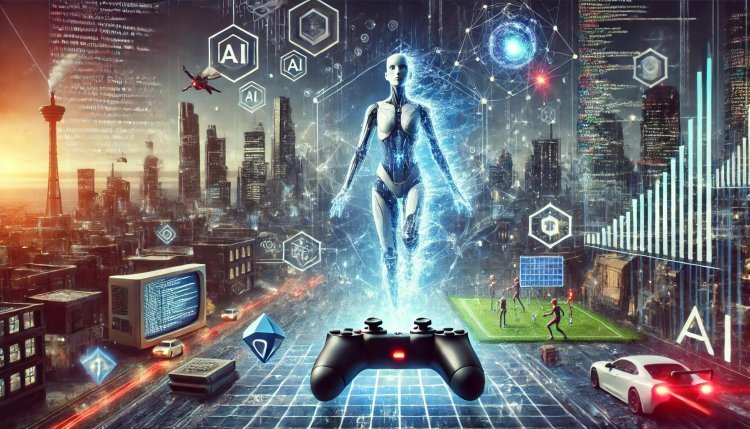The Growing Role of AI in Evolving Video Game Worlds
Explore how AI is transforming video games with adaptive gameplay, dynamic storytelling, and intelligent NPCs. Discover the future of AI-driven gaming worlds.

Artificial Intelligence (AI) has become a transformative force in the video game industry, reshaping the way games are designed, played, and experienced. From creating realistic non-player characters (NPCs) to designing adaptive game environments, AI has enhanced the complexity and immersion of video games. This article explores the expanding role of AI in shaping video game worlds, examining its impact on game mechanics, storytelling, and player engagement.
AI in Game Design: A Creative Partner
AI's role in game development has evolved from being a supplementary tool to a creative partner. Procedural content generation (PCG) is one of the most notable applications of AI, allowing developers to create expansive game worlds with diverse environments, levels, and challenges. Games like Minecraft and No Man’s Sky use AI-driven algorithms to generate vast landscapes and intricate ecosystems, ensuring no two players have the same experience.
Moreover, AI enhances character design by enabling NPCs to behave more realistically. Through machine learning, NPCs can analyze player actions and adapt their responses dynamically, creating more engaging and unpredictable interactions. For instance, in The Elder Scrolls V: Skyrim, NPCs can follow daily routines, react to the player's choices, and form relationships based on in-game behavior.
Adaptive Gameplay: Personalizing Player Experience
AI's adaptability makes it a powerful tool for tailoring gameplay to individual players. Adaptive difficulty systems analyze player performance and adjust challenges accordingly. Games like Left 4 Dead use an AI "Director" to control the pacing of the game, altering enemy spawns, item placements, and narrative events based on the player's skill level and decision-making.
Additionally, AI can facilitate player creativity by providing intelligent tools for customization. In sandbox games, AI assists players in building and modifying game elements, offering suggestions and automating repetitive tasks. This level of personalization empowers players to feel more connected to the game world and its possibilities.
Enhancing Storytelling with AI
Storytelling in video games has been revolutionized by AI-driven narrative systems. Traditional linear plots are being replaced by dynamic, branching narratives shaped by player choices. AI tools like procedural storytelling allow games to generate unique story arcs in real time, ensuring that players' actions have meaningful consequences.
For example, Detroit: Become Human employs advanced AI to create an intricate web of choices, where every decision influences character relationships and story outcomes. This level of interactivity not only increases replay value but also deepens emotional engagement by giving players a sense of agency in the narrative.
Real-Time Decision-Making and Opponent AI
AI-driven opponents are another area where technology has significantly advanced. Gone are the days of predictable enemy behavior; modern AI systems analyze player strategies and adapt to counter them. Games like Halo and StarCraft II feature AI opponents capable of learning and developing strategies, creating a more challenging and rewarding experience for players.
In multiplayer games, AI is also employed to fill gaps when human players are unavailable, ensuring seamless gameplay continuity. These AI substitutes are designed to mimic human behavior closely, making it difficult for players to distinguish between human and machine-controlled teammates or opponents.
AI in Virtual Reality and Augmented Reality
Virtual reality (VR) and augmented reality (AR) games benefit immensely from AI's capabilities. In VR, AI enhances immersion by creating lifelike interactions and responsive environments. For instance, in Half-Life: Alyx, AI enables NPCs and objects to respond naturally to the player's actions, fostering a sense of presence within the virtual world. Rubmd!
In AR games like Pokémon GO, AI powers object recognition and environmental mapping, allowing game elements to blend seamlessly with the real world. These advancements make gameplay more intuitive and engaging, bridging the gap between virtual and physical realities.
Ethical Considerations and Challenges
While AI has introduced numerous innovations, it also raises ethical concerns and challenges. One issue is data privacy, as AI often relies on player data to optimize gameplay. Developers must ensure transparent data practices and prioritize player consent.
Additionally, over-reliance on AI could lead to homogenization, where games lose their unique artistic identity in favor of algorithmically generated content. Striking a balance between AI-driven automation and human creativity is crucial to preserving the artistry of game development.
The Future of AI in Video Games
The integration of AI into video games is only set to deepen as technology advances. With the rise of generative AI models, developers can create even more complex narratives, characters, and worlds. AI-driven voice synthesis and natural language processing (NLP) will allow players to communicate with NPCs through natural conversation, opening new avenues for storytelling and immersion.
Furthermore, AI could enable entirely player-generated games, where players design their worlds, stories, and mechanics with minimal technical expertise. This democratization of game development could lead to a renaissance of creativity in the gaming industry.
Conclusion
AI has become an indispensable part of video game evolution, enhancing every aspect of the gaming experience. From procedurally generated worlds to adaptive storytelling and intelligent opponents, AI pushes the boundaries of what games can achieve. As the technology continues to mature, it promises to unlock even greater possibilities, making video games more immersive, dynamic, and personalized than ever before.
If you have experiences or insights on gaming in your community, we invite you to share your story with us at write for us gaming!
What's Your Reaction?












